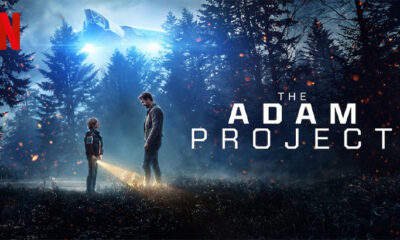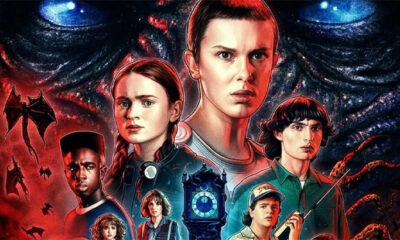REVIEWS
Dog Review
Published
3 years agoon

The movie follows the story of Jackson Briggs (Channing Tatum), a U.S. Army former soldier from Montana who is constantly trying to get employment with the diplomatic protection corps despite the head trauma experienced while he was deployed in the Middle East. Briggs needs a recommendation letter from a commanding officer to be taken into account. When Briggs comes to learn that his Army best mate Sgt. Riley Rodriguez has passed away suddenly and without warning, he assembles his old department to commemorate Riley’s time on earth. A commander presents Briggs with an opportunity to win his suggestion letter. He asks him to venture all along the pacific coast highway with Riley’s K-9 armed service dog, Lulu, a jittery and full of energy Belgian Malinois who is presently retired from service, in time to make it to Riley’s memorial service. Briggs is then intended to present Lulu to be put to sleep because she is no longer fit for K-9 responsibility. So, Briggs and Lulu work their way down to the memorial service while having numerous big and tiny excursions.
This potential crowd-pleaser misses the mark because of its oversimplified screenplay and surface-level diagnosis and treatment of darker themes, especially psychological well-being. Tatum, who also co-directed the movie with Reid Carolin, seems to be enjoying the moment, amidst Briggs’ pain and misery. But that suffering isn’t investigated intensively, nor are the armed services community’s psychological health catastrophes – a problem that is discussed only temporarily in a late-film discussion. The film is increasingly concentrated on Briggs’ friendship with Lulu, with several secondary characters. Magic Mike, Jane Adams and Kevin Nash’s appearances as Northern California hipsters growing cannabis bring comedic relief, and also make snacks and communicate telepathically with animals. Ethan Suplee makes an appearance in the final chapter as a good mentor for Briggs, who can’t appear to overcome Lulu’s situation.
There are a few chuckles, and it’s typically exciting to watch protagonists communicate with a trained and experienced dog, even if it’s a boisterous and turbulent one like Lulu. The visuals by Thomas Newman are cheerful, and his filmmaking manages to capture the warm and inviting road, the crowded SUV, and the shifting natural landscape that Briggs and Lulu come across as they travel down the Pacific coast highway. Nevertheless, without a coherent demeanor, the movie struggles to start coming together substantively.
The connection between Lulu’s and Riggs’ PTSD is rarely emphasized, but it’s still there. And its existence draws attention to an innovative way of connecting with somebody who is struggling. It’s easy to switch aside from a fully-skilled combat vet with anger problems and anxiety attacks. But it’s a tad bit difficult to look aside from Lulu’s big brown eyeballs, and it’s evident that just underneath her nose is a sad, frightened animal worth the time and effort to save.
Whatever the storyline’s goal was, it becomes more and more jumbled with each new intensification. A racist event is one particular screwup, with Tatum’s protagonist failing to find a pleasant space for him and the dog, who is then provoked by the glimpse of a Middle Eastern man who she then targets. There was a way this could’ve been conveyed with taste and questioning, but it’s the poor execution that merely reminds us that although the movie devotes a lot of time concentrating on the burdensome PTSD personally experienced by US military members, no attempt has been made to reassure us of all the other sides of the issue. It’s not handled with the sensitivity it merits, or with Tatum’s character’s humiliation. This is just another peculiar event that occurs in a movie full of weird plot points.
Dog is openly emotional. A film merely revolving around a dog and a military officer hardly could be otherwise. Thank goodness, Tatum’s self-deprecating charisma and Carolin’s screenplay maintain the narrative from being more and more detached. It’s also extremely careful about Lulu and Jackson’s military conflict perspectives, which are sort of vaguely comprehended as horrifying but also splendid. As neither is as complicated as an actual dog or an actual man, the movie is interesting to enjoy, but at the possible expense of some legitimacy. It’s pleasant and enthusiastic, but this is not a blockbuster.
Dog, while more predictable and boring, is more intriguing than the standardized man-mutt best mate movies, but it just never pulls at the emotional strings. Tatum’s movie star status more-so attempts to compensate for the complete absence of the necessary sentimental elements.
Visuals: 3.5/5
Plot: 3/5
Characters: 3/5
Music: 2/5
Originality: 3/5
More Movies + TV Shows
-


X Review
-


The Adam Project Review
-


Hustle Review
-


Fantastic Beasts: The Secrets of Dumbledore Review
-


Obi-Wan Kenobi Review
-


Everything Everywhere All At Once Review
-


The Boys: Season 3 Review
-


Moon Knight Review
-


Doctor Strange in the Multiverse of Madness Review
-


Stranger Things: Season 4 Review
-


Bad Vegan Review
-


The Batman Review

